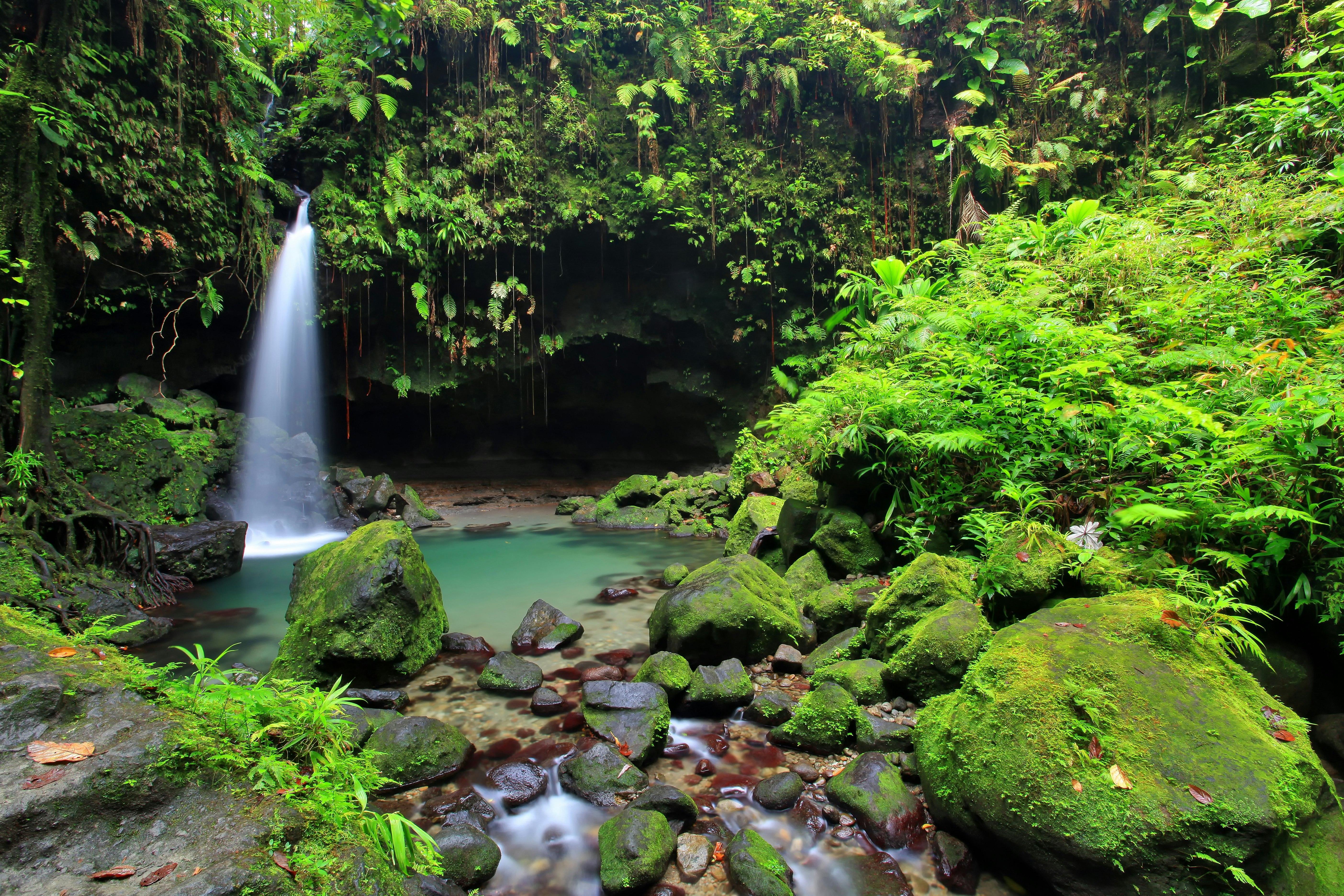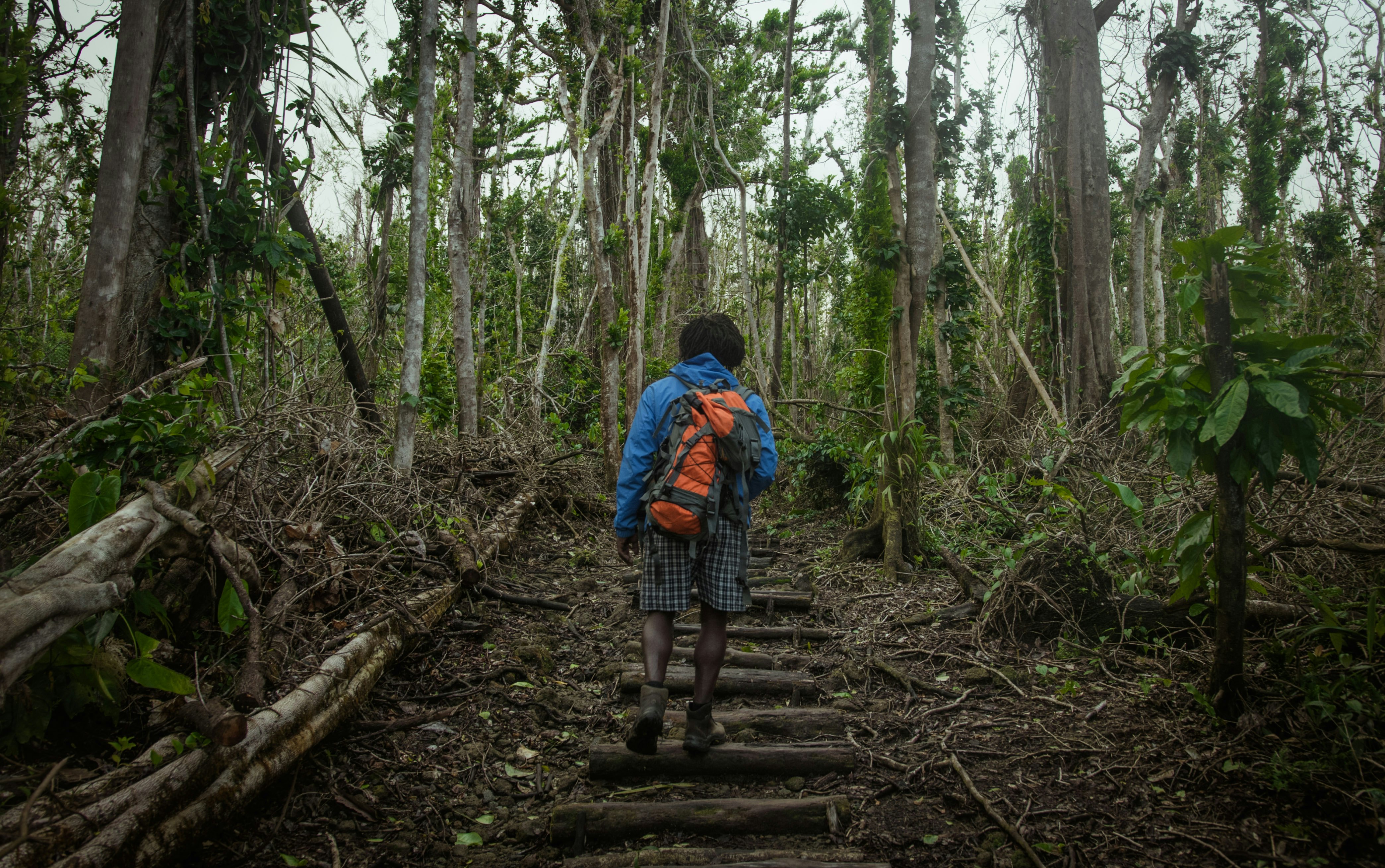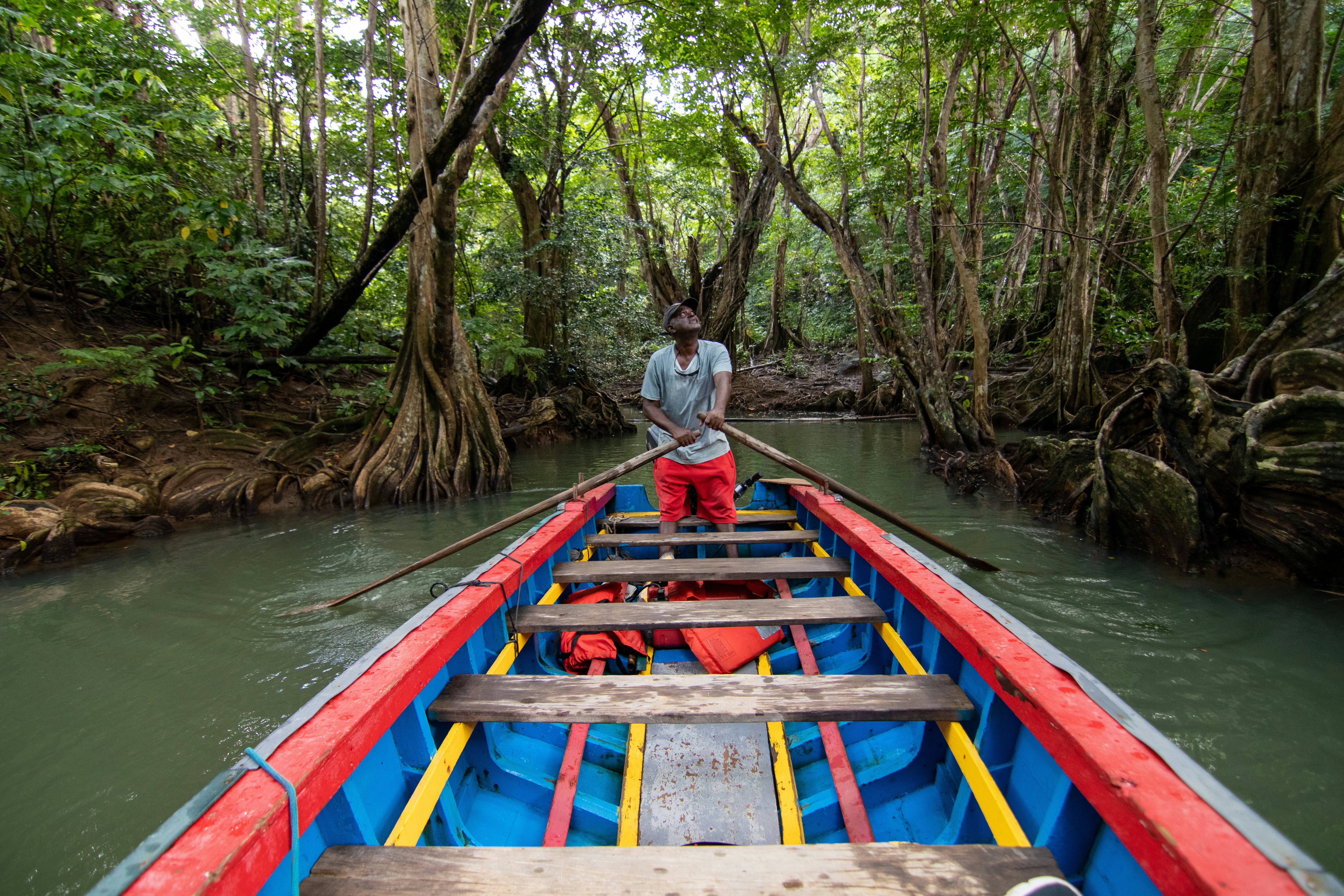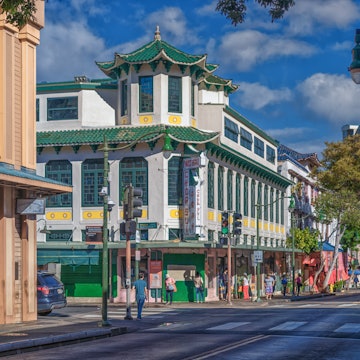

Wild nature – not beaches – is the main attraction in the Caribbean island of Dominica. Joseph Thomas Photography/Shutterstock
Dominica is one of the few Caribbean islands where the beach is the least captivating attraction.
The real reason to visit this tropical paradise? Natural outdoor experiences, which abound here. Blanketed in emerald vegetation and liberally sprinkled with hot springs, waterfalls, gorges, volcanoes and black sand, Dominica lets you get up close to nature at its most unspoiled and idyllic.
After all, in what other place would you find 365 rivers?
When should I go to Dominica?
The so-called Nature Island consists of 290 sq miles (751 sq km) of dense rainforests, deep gorges, towering mountains and natural hot springs – which add up to an optimal playground for ecotourists and adventurers.
Such rugged terrain unlocks year-round opportunities for exploration. When you go depends on your preferences and the kind of experience you’re looking for. As on most Caribbean islands, there’s really never a bad time to visit.
Dominica has two primary seasons: the dry season, which runs from December to May; and the wet (rainy) season, from June to November. The wet season is also hurricane season, so expect intermittent showers and potentially stormy weather.
(Category 5 Hurricane Maria hit the island in 2017). Barring a steady downpour, the rainy season typically allows for outdoor activities, too.
Dominica is blessed with warm waters all year round, perfect for exploring the island’s abundant marine life by scuba diving or snorkeling. If hiking is your vibe, the dry season is your time to shine; just be sure to head out early before the blazing midday temperatures set in.
If cultural exploration is more your speed, consider a getaway during Carnival, known locally as “Mas Dominik.” This colorful celebration takes place in the lead-up to Ash Wednesday, usually in February or early March. Another staple on the calendar is the World Creole Music Festival in October, which pays homage to marvelous, indigenous Dominican music, and features other popular genres.

How much time should I spend in Dominica?
Dominica is the perfect getaway if you’re searching for relaxation and renewal. Visitors should stay for a week or longer to make the most of their time on the island and let their stress truly go.
Is it easy to get in and around Dominica?
American Airlines provides daily direct service from its Miami hub, from which flights reach cities throughout the USA and the world.
Douglas-Charles (formerly Melville Hall Airport) is the larger of Dominica’s two airports, and lies a little over an hour’s drive from the capital of Roseau. Canefield Airport, which has propeller-plane service to other Caribbean islands, is 15 minutes from the capital. Visitors can also get to the island via the Express des Îles ferry service from Guadeloupe, Martinique and St Lucia.
Upon your arrival, you’ll have multiple options for navigating the island. Taxis are stationed outside both airports and at various spots around the capital. Privately owned minibuses – denoted by the letter “H” – ply several routes across the island.
You can flag one down by the roadside, depending on the area (fares start as low as EC$1.50 / US$.50). There is also the option of renting a vehicle, which you’ll need to purchase a permit for EC$30 (US$11) to do.
Top things to do in Dominica

Take a (very) long walk across the island
It’s possible to hike across the entire island along the Waitukubuli National Trail. This path is unique among Caribbean long-distance hiking routes – it’s the longest in the region – and extends an incredible 115 miles (185km) from tip to tip, starting in the southern village of Scotts Head and terminating at Cabrits National Park in the north.
Waitukubuli (the Indigenous Kalinago word for Dominica) weaves through thick rainforests and thunderous waterfalls like Trafalgar, with plenty of stops in thriving local communities along the way.
It’s an admittedly arduous trek, and hiking the entire trail will require a two-week commitment. Yet since it’s strategically chopped into 14 segments, you can pick your adventure based on time and level of difficulty.
Some sections are perfect for a family stroll, while others are more demanding and suitable for only seasoned explorers. If you’re up for the full challenge, it’s a truly immersive experience, one that gets you to the core of Dominican culture.
Decompress at one of the island’s natural spas
A tiny village tucked away in the Roseau Valley, Wotten Waven boasts a concentration of natural spas. While they are on the rustic side, these open-air havens might be just what you need to decompress.
Tikwen Glocho (literally “little corner of hot water”) is a garden sanctuary with adjacent cool springs and a collection of enormous stone pools brimming with therapeutic thermal waters in which you can take a soak to ease your tension. At Tia’s Hot Spa, you’ll find three large outdoor pools and two private pools encased in bamboo huts.
Screw’s Spa, perched on the outskirts of Wotten Waven, is a scenic retreat overlooking a river. The spa features several pools of varying depths and temperatures connected by cascading man-made waterfalls.

Float along the most famous of Dominica’s 365 rivers
Gliding down Dominica’s Indian River, the island’s most famous, is a peaceful way to absorb and appreciate the island’s seemingly untouched beauty.
The wildlife-laden route is fringed by thick greenery and shaded by a loose canopy of towering mangroves, while the twisted roots of bwa mang trees wrap around the swampy riverbank.
Moviegoers may recognize Tia Dalma’s Shack, a popular stop on the trip, from the Pirates of the Caribbean franchise. Don’t miss the signature Dynamite, a potent concoction of local cask rum, gooseberry, passionfruit, lime and guineps.
Uncover Dominica’s wild side at Morne Trois Pitons
In Morne Trois Pitons National Park, marvel at the striking Boiling Lake, which began as a volcanic crater and today is one of the world’s largest extra-hot bodies of water.
In the nearby, vividly named Valley of Desolation, bubbling fumaroles, steaming vents and hot springs make for an almost post-apocalyptic scene. Hikers exploring the area will also come across Ti Tou Gorge, a sliver of a canyon filled with gin-clear water.
And towering over it all is the park’s centerpiece, the imposing 4403ft (1342m) Morne Trois Pitons, whose summit unveils unfettered views of neighboring Morne Micotrin, Morne Watt and Morne Anglais.

My favorite thing to do in Dominica
Dominica has an untamed, raw quality that suggests how the place will stay itself even as visitors start catching on. This aura is reflected in my favorite Dominican event, the World Creole Music Festival, a three-day party that celebrates the island’s sensational music.
I grew up obsessed with the WCK Band, a legend of Bouyon music and Dominican culture. My body still moves involuntarily when ”Band Wagon Train,” “Balance Batty“ or ”Met Veye” catches my ear. And to witness a performance in Dominica at WCMF? Electric.
How much money do I need for Dominica?
Tourists from the US, Canada, the UK, and Europe can take advantage of a favorable currency-exchange rate when they convert their money to Eastern Caribbean dollars.
Accommodations: EC$270–540 (US$100–200) per night
Restaurants: EC$30–200 (US$11–74)
Public transportation: EC$1.50–12.50 (US$.50–4.50)
Private taxi service: EC$80–250 (US$30–92)
Glass of rum punch: EC$12–20 (US$4.50–7.50)
Cup of coffee or cocoa tea: EC$5.40–13.50 (US$2–5)
More tips for enjoying Dominica

Wear dark swimsuits in hot waters
If you’re visiting a sulfur spring, remember that light swimming suits and trunks will easily stain. It’s also wise to remove your jewelry before entering the pool to avoid damaging the metal.
Carry cash
Some businesses don’t accept credit or debit cards, and it is unlikely that any will accept Apple Pay. So it’s always advisable to carry some cash – either local EC or US dollars – to ensure smooth transactions, especially at smaller establishments.
Hire a guide to get the most out of your nature excursions
Some segments of the Waitukubuli National Trail are more difficult and dangerous than others. Hire a knowledgeable guide – you can contact the Forestry, Wildlife and Parks Division for recommendations – and don’t attempt the hike alone.
Depending on your selected segment, you might also need a hiking pass, which can also be purchased through the forestry agency. As an extra safety precaution, inform representatives at your accommodation of your hiking plans before you set out.






















